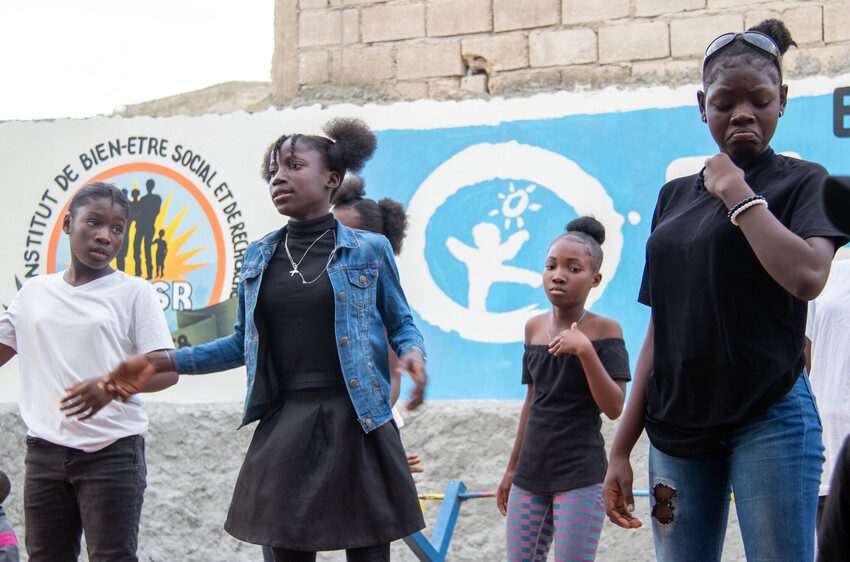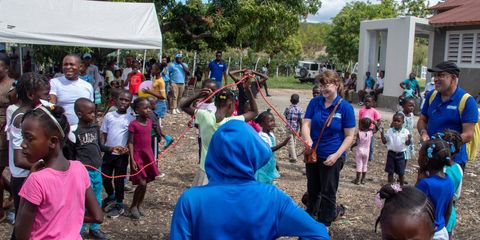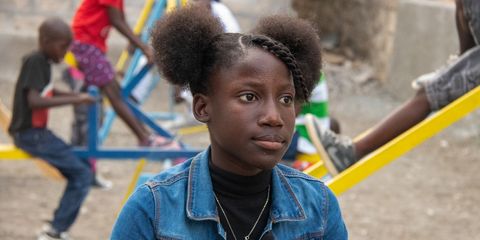Haiti violence heightens children’s emotional stress
18 March 2024International assistance is required to support children’s mental health as violence in Haiti takes an increasingly heavy toll.
Plan International is concerned by the significant increase in violence in Haiti and the heavy toll it is taking on children’s mental health. Children cannot play or be children while the psychological impact of the crisis does not receive enough attention.
With thousands displaced and more than 1 million people in need of immediate humanitarian assistance, Haiti faces a dire protection crisis which continues to deteriorate by the day. In the past week, armed groups have conducted coordinated attacks on critical infrastructure across Port-au-Prince, Haiti’s capital city, restricting humanitarian workers’ access to affected areas.
All ports are closed in an attempt to suffocate the country and prevent the transport of aid. Humanitarian operations have been directly affected by the violence and attacks have become increasingly arbitrary.
Emotional support critical
While life-saving assistance, such as the provision of water and food supplies, is crucial to protect all civilians, prioritising the emotional care and support for children and adolescent girls is equally critical.
“Addressing the emotional needs of children is not only necessary but also possible,” said Dr. Unni Krishnan, Global Humanitarian Director at Plan International, who recently visited Haiti.
“Simple steps such as organising schools, education and a sense of safety and play, can help to mitigate the emotional effects of armed group violence,” he said.
“Simple steps can help to mitigate the emotional effects of armed group violence.”
Dr. Unni Krishnan, Global Humanitarian Director at Plan International
Dr. Krishnan, co-author of Psychological First Aid, a reference guide in humanitarian settings, explains that armed groups violence, displacement, insecurity and anxieties have a cumulative impact.
“Young minds can be likened to a balloon. There is only so much they can take,” said Dr Krishnan. “As you pump more air into the balloon, it eventually reaches its limit and can’t take anymore.”
Dire need for protection services
The violence has caused a lot of uncertainty and anxiety for Haitian children, adolescents and youth. The latest UNICEF snapshot from 24 March indicated that 1.3 million children need protection services. Many have been forced to leave their homes which makes them even more vulnerable and exposed to a variety of risks, such as forced recruitment and sexual and gender-based violence.
They need support to access food, education and a safe space to feel like children again. The situation requires immediate attention and the response of the international community.
“Plan International is deeply concerned about the security, integrity, mental and emotional well-being of vulnerable groups. For the sake of children and adolescent girls in Haiti, we call for an immediate end to this violence,” said Allassane Drabo, Country Director of Plan International Haiti.
Support for vulnerable children

Since July 2022, Plan International has been scaling up its response to the humanitarian crisis in Haiti, focusing on protecting and meeting the life-saving needs of children and young people. We have moved with urgency to protect Haiti’s most vulnerable, paying special attention to the specific needs of children, girls and young women. Priority support is being provided to those who are unaccompanied, separated from their families, displaced by conflict, or survivors of gender-based violence.
We have also opened child-friendly spaces (a safe place where play and other recreational activities are organised) and provided psychosocial support. In some of the most affected areas, with severe access problems and capacity constraints, such as the Artibonite and Northeast departments, we have provided health services, supported family reunifications and preserved cultural activities amid the crisis. Despite this work and that of our partners, it is essential to increase humanitarian aid efforts to expand and strengthen child protection services.
As the European Humanitarian Forum convenes in Brussels today, it is imperative that the plight of children in Haiti receives the attention it needs. “The European Humanitarian Forum provides a timely opportunity to shine a spotlight on the neglected needs of Haiti’s forgotten children,” said Dr. Krishnan. “We urge that the humanitarian crisis in Haiti is not overlooked and meaningful actions are taken to address multiple disasters impacting Haitians.”
Categories: Emergencies, Protection from violence

